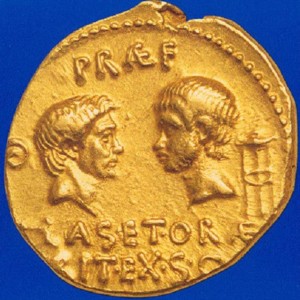 Jews of Rome; The Temple Tax Paid By Jews in the Roman Empire
Jews of Rome; The Temple Tax Paid By Jews in the Roman Empire
The Jewish population in Rome was substantially increased in the autumn of 61 B.C.E., when Gnaeus Pompey (the Great) returned in triumph from his eastern conquests, bringing back numerous captives, among them many Jews taken at the capture of Jerusalem where the Roman general had intervened in behalf of Hyrcanus against Aristobulus, his younger brother and rival for the throne.
By the year 59 B.C.E, a mere two years after Pompey’s triumphant return, the Jews of the city were already a formidable element in Roman politics, a definite indication that there must have been a solid nucleus of Jews in Rome for some years prior to 59. It was doubtless this group of well-established residents that saw to the freeing of their coreligionists and to assisting them in becoming an integrated part of the economic and social life of the Capital.
Cicero’s speech, is the noted address which he delivered in October of 59 before a Roman Jury in defense of Lucius Valerius Flaccus, a Roman aristocrat, who was charged with extortion and misappropriation of funds while serving as governor (propraetor) of the Roman province of Asia in the year 62. Among the charges against Flaccus was the accusation that he had confiscated the gold which the Jews of the province had collected for their annual contribution toward the maintenance of the Temple at Jerusalem. To this fund the Jews throughout the Diaspora contributed and, so far as we know, no difficulties had hitherto been raised about their sending the money to Jerusalem.
Cicero’s words are worth quoting in extenso, since they not only offer a typical instance of the superb art which made him Rome’s most effective pleader but also present significant information about the status of the Jews at that particular time:
Pro Flacco
We come now to the libel involving the gold, the Jewish gold. This is obviously the reason why the present case is being tried close to the Aurelian Steps. It is because of this particular charge that you have sought out this location, Laelius, and that mob. You know how large a group they are in politics. I will lower my voice and speak just loudly enough for the jury to hear me; for there are plenty of individuals to stir up those Jews against me and against every good Roman, and I don’t intend to make it any easier for them to do this. Since gold was regularly exported each year in the name of the Jews from Italy and all our provinces to Jerusalem, Flaccus issued an edict forbidding its exportation from Asia. Who is there, gentlemen of the jury, who cannot sincerely commend this action? The exportation of gold had been forbidden by the Senate on many previous occasions, and most strictly of all during my consulship [four years previously]. Furthermore, that Flaccus opposed this barbarous superstition [i.e. Judaism] was a proof of his strong character, that he defended the Republic by frequently defting the aggressiveness of the Jewish mobs at political gatherings was an evidence of his high sense of responsibility. But, we are told, when Gnaeus Pompey captured Jerusalem, the victorious commander touched not a thing in that shrine. This was a typically shrewd act on his part. In a state as suspicious and as slanderous as ours, he left his detractors no room for criticism. I surely do not believe that the distinguished general was deterred by the religion of the Jews, who were our enemies besides, but it was rather his scrupulous honesty which deterred him. Now where does that leave the accusation, since you make absolutely no charge of embezzlement, you approve the edict, you admit that there was due process of law, you do not deny that the whole procedure was carried on openly and publicly, and the fact reveals that men of the highest prominence had a part therein?
As for Flaccus, thanks to the masterly defense by Hortensius, whose speech is not preserved, and especially by Cicero, he was acquitted and escaped a merited punishment. Although his confiscation of the Jewish gold was vindicated in this trial, there is no evidence that the ban on the export of this gold was applied further, and we may assume that the Jews of Rome, Italy, and the provinces continued to make their annual contributions to the Temple.
Source: Leon, Harry J. The Jews of Ancient Rome. (p. 4-8); We know from a later source, Macrobius Saturnalia 2. 1. 13, that the case against Flaccus was a strong one. Macrobius actually calls Flaccus “entirely guilty” (nocentissimus) and says that Cicero saved him de manifestissimus criminibus.